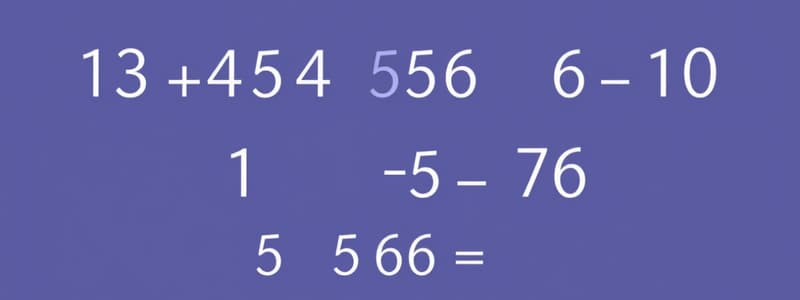Podcast
Questions and Answers
What is the result of applying the inverse property of addition to the number 4?
What is the result of applying the inverse property of addition to the number 4?
- 4 + (−4) = 4
- 4 + 0 = 4
- 4 + (−4) = 0 (correct)
- 4 + (−4) = 1
Which equation correctly demonstrates the inverse property of multiplication?
Which equation correctly demonstrates the inverse property of multiplication?
- (−a) * a = 1
- a * (1/a) = 0
- (a) * (1/a) = 1 (correct)
- a * 0 = 1
Which of the following represents the closure property correctly?
Which of the following represents the closure property correctly?
- 5 + 3 = 8 (correct)
- 5 + 3 = 0
- 5 * (2 + 3) = 10
- 5 - 3 = 2
Identify the property represented in the expression (a + b) + c = a + (b + c).
Identify the property represented in the expression (a + b) + c = a + (b + c).
What is the outcome when applying the inverse property of addition to the number −2?
What is the outcome when applying the inverse property of addition to the number −2?
Which statement accurately describes irrational numbers?
Which statement accurately describes irrational numbers?
What is a defining characteristic of rational numbers?
What is a defining characteristic of rational numbers?
Which of the following is an example of an integer?
Which of the following is an example of an integer?
Which of the following numbers is classified as a natural number?
Which of the following numbers is classified as a natural number?
What can be said about the set of real numbers?
What can be said about the set of real numbers?
Which of the following correctly describes whole numbers?
Which of the following correctly describes whole numbers?
Which scenario exemplifies a repeating non-terminating decimal?
Which scenario exemplifies a repeating non-terminating decimal?
Which statement about numbers is NOT true?
Which statement about numbers is NOT true?
What does the Commutative Property state regarding addition?
What does the Commutative Property state regarding addition?
Which statement is true concerning the operations on integers?
Which statement is true concerning the operations on integers?
Which property indicates that the sum or product of any two real numbers is also a real number?
Which property indicates that the sum or product of any two real numbers is also a real number?
According to the Identity Property of addition, which equation is correct?
According to the Identity Property of addition, which equation is correct?
In the Distributive Property, how would you express 12(4 + 3)?
In the Distributive Property, how would you express 12(4 + 3)?
Which operation does the Associative Property apply to?
Which operation does the Associative Property apply to?
What is an example of an irrational number?
What is an example of an irrational number?
Which example illustrates the Commutative Property of multiplication?
Which example illustrates the Commutative Property of multiplication?
Which of these is an example of a correct usage of a double negative?
Which of these is an example of a correct usage of a double negative?
The statement 'I miss not seeing him every day' is a correct usage of 'miss'.
The statement 'I miss not seeing him every day' is a correct usage of 'miss'.
What are two words that can indicate a negative meaning but don't contain negative affixes?
What are two words that can indicate a negative meaning but don't contain negative affixes?
What is the correct meaning of 'affect'?
What is the correct meaning of 'affect'?
What does 'beside' mean?
What does 'beside' mean?
What is the difference between 'farther' and 'further'?
What is the difference between 'farther' and 'further'?
The waiter wasn't doing ______ but standing around smoking.
The waiter wasn't doing ______ but standing around smoking.
What is the verb form of 'adapt'?
What is the verb form of 'adapt'?
Flashcards are hidden until you start studying
Study Notes
Real Number System Overview
- Real numbers (ℝ) combine rational and irrational numbers, covering all numbers on the number line without including imaginary numbers.
- Real numbers can be represented as infinite decimal expansions.
Types of Real Numbers
- Irrational Numbers (ℚ′): Cannot be expressed as a quotient of two integers; characterized by non-terminating and non-repeating decimals (e.g., π, √2).
- Rational Numbers (ℚ): Can be represented as a fraction (a/b) where 'a' and 'b' are integers and b ≠ 0; includes:
- Non-repeating, terminating decimals (e.g., 0.5)
- Repeating, non-terminating decimals (e.g., 0.333…)
- Repeating, terminating decimals (e.g., 0.555…)
- Integers (ℤ): All whole numbers, including negative and positive; addition, subtraction, and multiplication of integers yield integers.
- Whole Numbers: Non-negative integers including 0.
- Natural Numbers (ℕ): Counting numbers starting from 1, excluding 0.
Properties of Real Numbers
- Closure Property: Real numbers remain within the set when performing addition, subtraction, and multiplication (e.g., 8 - 4 = 4).
- Associative Property: The grouping of numbers does not affect the result in addition and multiplication (e.g., (a + b) + c = a + (b + c)).
- Commutative Property: The order of numbers does not influence the outcome in addition and multiplication (e.g., a + b = b + a).
- Distributive Property: A number multiplied by a sum equals the sum of the individual products (e.g., a(b + c) = ab + ac).
- Identity Property:
- For addition, adding zero to a number returns the same number (a + 0 = a).
- For multiplication, multiplying a number by one yields the same number (a x 1 = a).
- Inverse Property:
- For addition, a number plus its negative equals zero (a + (-a) = 0).
- For multiplication, a number multiplied by its reciprocal equals one (a x (1/a) = 1, where a ≠ 0).
Practice Questions
- True or False:
- All irrational numbers are real numbers.
- All real numbers are natural numbers.
- All integers are rational numbers.
- All decimals are irrational numbers.
- -45 is a whole number.
Summary of Exercises
- Exercise examples illustrate the various properties:
- Identifying properties in equations, such as showing the closure property with 4 + (-4) = 0 and the inverse property with a x (1/a) = 1.
Double Negatives
- A double negative occurs when two negative words are used in a statement, leading to confusion.
- Common incorrect examples include phrases like "I ain't seen nobody" and "I haven't no time now."
- Correct forms replace double negatives, e.g., "I haven't seen anybody" and "I have no time now."
- Common negative words include: no, not, nothing, never, none, no one, nowhere, neither, and nobody.
- Words with a negative connotation but lacking overt negative affixes: hardly, scarcely, barely.
Emphasis in Negatives
- Words like nobody, nothing, and never can emphasize statements but require careful use.
- Use "not anybody" and "not ever" for accurate negative meaning since anybody and ever aren't negative.
- Double negatives can be correctly used for emphasis: "There is no way I cannot visit my mother this year" implies urgency to visit.
Conjunctions with Negatives
- Use "not...or" to connect multiple nouns, verbs, or adjectives: "He doesn't drink or dance."
- "Not...nor" emphasizes a second idea, e.g., "Our main objective is not oil, nor power."
- The verb "miss" conveys a negative concept; examples show usage without additional negatives: "I miss seeing him every day."
Common Usage Problems
- Accept vs. Except: "Accept" means to agree or receive, while "except" means excluding.
- Adapt vs. Adopt: "Adapt" means to adjust, while "adopt" means to accept or choose.
- Affect vs. Effect: "Affect" is typically an action verb, "effect" is a noun describing a thing.
- Beside vs. Besides: "Beside" means close to; "besides" means in addition to or furthermore.
Distance and Advancement
- Farther: An adjective/adverb indicating greater physical distance.
- Further: Indicates greater distance; also used for "more" or "additionally" in other contexts.
- Example uses: "Colorado is farther from New York than Iowa" and "I intend to investigate further."
Studying That Suits You
Use AI to generate personalized quizzes and flashcards to suit your learning preferences.




